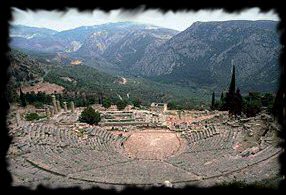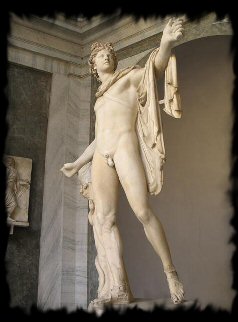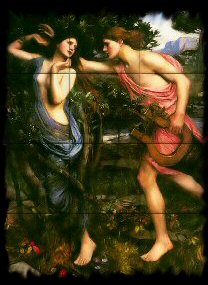|
|

T h e M y t h
The mythological origins of the 'Olympics' include the story where Pelops defeated and killed his future father-in-law King Oenomaus
in a chariot race, and that Hercules put on the games to honour his father after he won over the perfidious King Augeas.
The Mythological background:
 Left: The place in Delphi where the Pythian Games took place.
Left: The place in Delphi where the Pythian Games took place.
The Pythian Games, like the Olympic Games, grew from mythological origins. During the great flood instigated by Zeus to destroy the
creatures of the earth, he permitted Deucalion and Pyrrha to live by staying safe in a boat. As the flood receded, they landed on Mount
Parnassus, but they grew lonely at the lack of company and consulted the Oracle of Themis who advised them:.
“Depart from me and veil your brows; ungird your robes, and cast behind you as you go, the bones of your great mother.”
Deucalion, being skilled in the ways of oracles, understood that the bones of the great mother, Gaia, were rocks, and so he and his wife
walked away throwing stones behind them. The stones Deucalion threw became men; those Pyrra threw, women. When they had finished throwing
rocks, Gaia continued to produce men and women, and then formed animals, including a giant python fashioned from mud and slime.
This was a time of great simplicity, when god and man had nothing more lethal than a bow and arrow. All Apollo had was the bow he used
to kill tame, game animals like deer, and goats, Still, he resolved to rid humankind of the frightening monstrosity, and shot his entire
quiver of arrows into the beast eventually killing it. To remind humanity of the debt they owed him, and so that they could honour him,
Apollo instituted the Pythian Games.
 Unlike the other Pan-Hellenic games (Olympics, Nemean and Isthmian), music was a major part of the competition. Originally, it was all
kinds of music, and the athletic events only came later on. The first three days were devoted to musical competition, the next three to
athletic competitions, and the final day to worship of Apollo. This unique emphasis on music was a fitting tribute to Apollo, the gifted,
yet competitive musician.
Unlike the other Pan-Hellenic games (Olympics, Nemean and Isthmian), music was a major part of the competition. Originally, it was all
kinds of music, and the athletic events only came later on. The first three days were devoted to musical competition, the next three to
athletic competitions, and the final day to worship of Apollo. This unique emphasis on music was a fitting tribute to Apollo, the gifted,
yet competitive musician.
• Top •
Right: Statue of Apollo
When Pan claimed he could make better music on his syrinx than Apollo on his lyre, and asked Midas to judge, Midas awarded Pan the victory.
Apollo appealed to a higher judge, a fellow god, won, and rewarded Midas for his honest opinion with a pair of donkey ears. Apollo did
not just compete with the goat god Pan. He also competed with the love god, which is a foolish move. Filled with bravery from slaying
the mighty python, Apollo looked at the god-of-loves delicate little golden arrows and his equally unthreatening dull, heavy, iron ones.
He laughed at Eros, saying that his arrows were worthless. They might have had a competition, but instead Apollo grew angry. He told Eros
to content himself with flames and leave arrows to the strong and brave.
Eros bow and arrows might have seemed "worthless", yet, they were not. Furious by the condescension, Eros resolved to prove whose bow was
truly powerful and shot Apollo with a golden arrow so that he would fall hopelessly in love with the woman whom Eros shot with the iron.
With the iron arrow, Eros pierced the heart of Daphne, forever turning her against love.
 The Myth about the origin of Laurel Wreath
The Myth about the origin of Laurel Wreath
Thus, Apollo was doomed to pursue Daphne, and Daphne was doomed to flee from his advances. However, Daphne was not a goddess and had
little chance against Apollo’s might. Eventually, when it looked as though Apollo would have his hateful way with her, she begged
to Gaia save her, which he did by turning her into a laurel tree just as Apollo reached for her with his hand. Disappointed, and with
eyes full of tears, Apollo wove a wreath from the branches of the tree and wore the wreath made from the leaves of his beloved. Therefore,
in honour of Apollo, the victor of his Pythian Games received a crown of laurel leaves.
Above: Apollo in a run after fleeing Daphne © 2001-2003 Wylde Art and used with permission.

|

 Left: The place in Delphi where the Pythian Games took place.
Left: The place in Delphi where the Pythian Games took place.
 Unlike the other Pan-Hellenic games (Olympics, Nemean and Isthmian), music was a major part of the competition. Originally, it was all
kinds of music, and the athletic events only came later on. The first three days were devoted to musical competition, the next three to
athletic competitions, and the final day to worship of Apollo. This unique emphasis on music was a fitting tribute to Apollo, the gifted,
yet competitive musician.
Unlike the other Pan-Hellenic games (Olympics, Nemean and Isthmian), music was a major part of the competition. Originally, it was all
kinds of music, and the athletic events only came later on. The first three days were devoted to musical competition, the next three to
athletic competitions, and the final day to worship of Apollo. This unique emphasis on music was a fitting tribute to Apollo, the gifted,
yet competitive musician.
 The Myth about the origin of Laurel Wreath
The Myth about the origin of Laurel Wreath